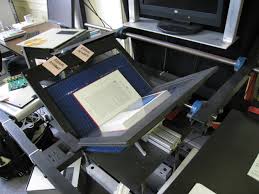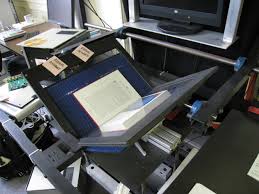
Rejecting claims from a group of authors that the book scanning project illegally deprives them of revenue, a U.S. appeals court ruled on Friday that Google's massive effort to scan millions of books for an online library does not violate copyright law.
Infringement claims from the Authors Guild and several individual writers were rejected by the 2nd U.S. Circuit Court of Appeals in New York and found that the project provides a public service without violating intellectual property law.
A year after the project was launched in 2005, the authors had sued Google for the project alleging infringement of copy rights. Google’s parent company is now named Alphabet Inc. The authors claimed that the scanning illegally deprived them of revenue.
However Google said that by making it easier for readers to find works, the project would actually boost book sales and introduce the books the readers might might not otherwise have seen.
Neither Google nor the appointed lawyer for the authors said anything about the issue.
Google had said it could face billions of dollars in potential damages if the court had ruled in favor of the authors.
A three-judge panel's vote was unanimous. The summary opinion written by Judge Pierre Leval of the 2nd U.S. Circuit Court of Appeals in Manhattan, in the case of Authors Guild v. Google, Inc:
"Google's unauthorized digitizing of copyright-protected works, creation of a search functionality, and display of snippets from those works are non-infringing fair uses. The purpose of the copying is highly transformative, the public display of text is limited, and the revelations do not provide a significant market substitute for the protected aspects of the originals. Google's commercial nature and profit motivation do not justify denial of fair use. Google's provision of digitized copies to the libraries that supplied the books, on the understanding that the libraries will use the copies in a manner consistent with the copyright law, also does not constitute infringement. Nor, on this record, is Google a contributory infringer."
The case was dismissed at the lower court level by Circuit Judge Denny Chin, who oversaw the case at the lower court level in 2013 following which the authors had appealed to the appellate court.
Chin found Google's scanning of tens of millions of books and posting "snippets" online constituted "fair use" under U.S. copyright law.
While noting that the project by Google "tests the boundaries of fair use" a unanimous three-judge appeals panel ultimately decided that Google's practices were ultimately allowed under the law.
"Google’s division of the page into tiny snippets is designed to show the searcher just enough context surrounding the searched term to help her evaluate whether the book falls within the scope of her interest (without revealing so much as to threaten the author’s copyright interests)," Circuit Judge Pierre Leval wrote for the court.
A consortium of universities and research libraries that built a searchable online database of millions of scanned works was also sued by the Authors Guild in June 2014 which was rejected by the 2nd Circuit.
Google Books began after the company agreed with several major research libraries to digitize current and out-of-print books from their collections.
Former New York Yankees pitcher Jim Bouton, the author of the acclaimed memoir, "Ball Four" was among the individual plaintiffs who filed the proposed class action against Google.
(Source:www.reuters.com & www.npr.org)
Infringement claims from the Authors Guild and several individual writers were rejected by the 2nd U.S. Circuit Court of Appeals in New York and found that the project provides a public service without violating intellectual property law.
A year after the project was launched in 2005, the authors had sued Google for the project alleging infringement of copy rights. Google’s parent company is now named Alphabet Inc. The authors claimed that the scanning illegally deprived them of revenue.
However Google said that by making it easier for readers to find works, the project would actually boost book sales and introduce the books the readers might might not otherwise have seen.
Neither Google nor the appointed lawyer for the authors said anything about the issue.
Google had said it could face billions of dollars in potential damages if the court had ruled in favor of the authors.
A three-judge panel's vote was unanimous. The summary opinion written by Judge Pierre Leval of the 2nd U.S. Circuit Court of Appeals in Manhattan, in the case of Authors Guild v. Google, Inc:
"Google's unauthorized digitizing of copyright-protected works, creation of a search functionality, and display of snippets from those works are non-infringing fair uses. The purpose of the copying is highly transformative, the public display of text is limited, and the revelations do not provide a significant market substitute for the protected aspects of the originals. Google's commercial nature and profit motivation do not justify denial of fair use. Google's provision of digitized copies to the libraries that supplied the books, on the understanding that the libraries will use the copies in a manner consistent with the copyright law, also does not constitute infringement. Nor, on this record, is Google a contributory infringer."
The case was dismissed at the lower court level by Circuit Judge Denny Chin, who oversaw the case at the lower court level in 2013 following which the authors had appealed to the appellate court.
Chin found Google's scanning of tens of millions of books and posting "snippets" online constituted "fair use" under U.S. copyright law.
While noting that the project by Google "tests the boundaries of fair use" a unanimous three-judge appeals panel ultimately decided that Google's practices were ultimately allowed under the law.
"Google’s division of the page into tiny snippets is designed to show the searcher just enough context surrounding the searched term to help her evaluate whether the book falls within the scope of her interest (without revealing so much as to threaten the author’s copyright interests)," Circuit Judge Pierre Leval wrote for the court.
A consortium of universities and research libraries that built a searchable online database of millions of scanned works was also sued by the Authors Guild in June 2014 which was rejected by the 2nd Circuit.
Google Books began after the company agreed with several major research libraries to digitize current and out-of-print books from their collections.
Former New York Yankees pitcher Jim Bouton, the author of the acclaimed memoir, "Ball Four" was among the individual plaintiffs who filed the proposed class action against Google.
(Source:www.reuters.com & www.npr.org)





